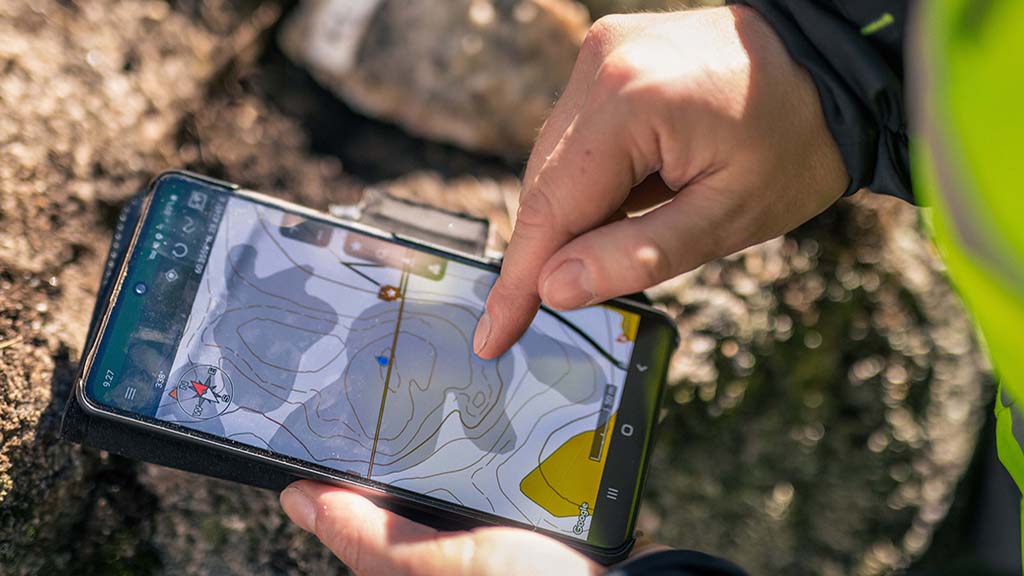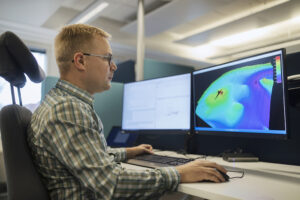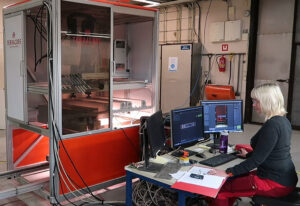Management of National Geodata Is One of Basic Tasks of Geological Survey of Finland
High-quality and up-to-date geological data is one of the basic prerequisites for producing sustainable and modern solutions for a wide variety of challenges, including climate change, clean drinking water, circular economy, and green energy requirements.

Managing national geological data is one of the basic tasks of the Geological Survey of Finland (GTK). GTK is responsible for the preservation and accumulation of the national geoscientific information reserves and for developing diverse possibilities for using the data included in it. The information reserves contain geological, geophysical, and geochemical data.
The datasets are divided into different themes including bedrock, soil, mineral raw materials, hydrogeology, and marine geology, as well as entities related to environmental research such as soil geochemical baselines, acid sulphate soils, and mire and peatland related data. The data consists of observations, measurements, interpretations, models, reports, and photographs. Most of the geoscientific data is spatial data, which means it can be processed and refined by combining and analysing data from various sources.
GTK has been collecting data in its field since its establishment, which explains why most of the data sets have been compiled over several decades. The life cycle of geoscientific data is long, and therefore data collected in the 1990s is still useful today when new research targets are searched and defined. Users of the legacy data should be familiar with the data quality, which may vary for several reasons, including the applied analytical methods and measuring instruments, human factors, and positioning methods. Information on the collection, processing and quality of the data can be found in the metadata of the database. All these factors affecting to data collection and quality of data are described in metadata.
Improvements to the usability and distribution of data

Over the years, GTK has spent a significant portion of its funding on the digitalisation of data and on improving the usability and distribution of the data, but there is still much to be done in terms of data processing and quality improvement.
At present, the majority of new data comes from GTK’s three-year hyperspectral scanning campaign on drill cores, in which the last scanning phase is in autumn 2023, from ground geophysical surveys and from ground investigations carried out by stakeholders. Moreover, groundwater studies generate significant quantities of data, as well. GTK ended vast field data collection programmes many years ago, but the near future will show whether similar initiatives can be relaunched in connection with the implementation of the EU’s Critical Raw Materials Act, possibly with new funding models and in collaboration with partners.
GTK has always possessed strong expertise in the field of geoscientific data, but the constant development of technologies, data collection methods and AI-based processing methodologies set requirements for continuous renewal and competence development. Competence in the field is in high demand, both in Finland and abroad. Indeed, expert services related to geoscientific data and its management are highly sought after also in international export projects.
GTK offers plenty of digital material, and most of it is publicly available
One of GTK’s strenghts is the vast amount of publicly available digital data it possesses. Furthermore, GTK has productised much of the data collected over extensive time period, and provides customer service when accessing any materials, making it possible to obtain guidance and customized data sets for customers. Moreover, GTK offers expert services on regional geology and refining the data.
Some of GTK’s public materials are available with open licence, whereas some are distributed with GTK’s basic licence and available either free of charge or for a fee, depending on the material. Most of the open data shared by GTK consists of small-scale spatial data products, which are widely used for many application areas. The cornerstones of GTK’s data policy are fairness and continuous development of customer services.
In fact, customer feedback on the datasets and services is collected regularly, and more detailed interviews are also conducted to improve GTK’s overall customer understanding. Based on the feedback, GTK develops and renews its services to meet the customers’ needs and to further promote the utilisation of the data.
Maintenance and distribution of geoscientific data requires funding

In addition to the basic appropriations received from the State, GTK’s funding is largely based on income financing, which also includes charging a fee for some of the data. The costs of digital solutions used in data management and distribution are on the rise, and income financing is also used for covering these costs. The maintenance of online services requires continuous work in terms of both the technology and content. At present, GTK is in the process of renewing its Hakku search and download services with separate funding from the Ministry of Economic Affairs and Employment of Finland.
Every now and then, there emerges suggestions that most of GTK’s data should be available with open licence. Open data means that the material is available in a machine-readable format in online services, free of charge and with unrestricted rights of secondary use, for any party in the world from private individuals to state-level actors.
The risks associated with spatial datasets are a theme that has become particularly topical since Russia invaded Ukraine in February 2022. Whenever spatial data is made available, a risk analysis must always be carried out in terms of both individual datasets and their combinations and with due consideration for the safety of the society at large.
At present, GTK datasets can be accessed independently through the geo.fi portal, which includes interface services and map applications of spatial data, and the Hakku search and download services among others, and through personal customer services provided by GTK (geodata@gtk.fi).
Text
Katja Lalli, Head of Unit, GTK
Olli Breilin, Director, Operative Units, GTK
Niina Ahtonen, Director, Geoscience Information and ICT, GTK (until August 31 2023)
The text was originally published in Finnish in Materia magazine vol 4-2023.
